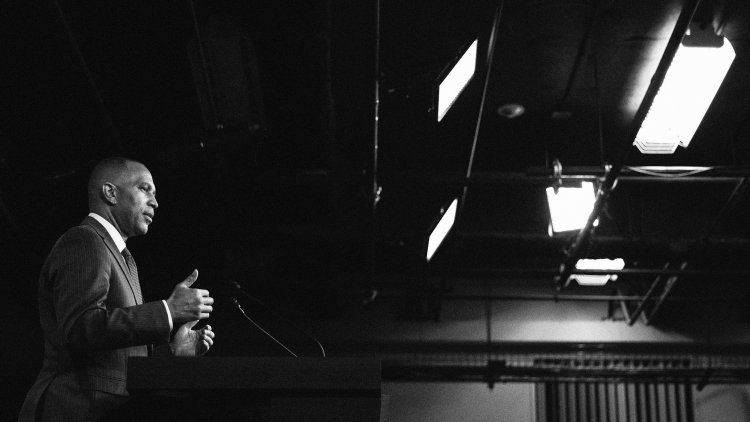The Democrats’ Prisoner’s-Dilemma Moment
Everyone is unhappy with the unresolved questions around Joe Biden’s candidacy. No one can decide what to do about it.

It’s time for some game theory.
The Democratic Party is now in the third week of a nightmare, and the reason it can’t seem to wake up is explained by the classic concept of the prisoner’s dilemma: The most influential figures in the party can’t know what their best course of action is, because they don’t know what everyone else will do.
Everyone agrees that the status quo—unresolved questions about whether President Joe Biden can or should go on as the party’s presidential nominee—is unsustainable. But no one has a good reason to change their current behavior.
One group of Democrats believes that Biden is the only viable or reasonable option. This might be uncomfortable, but it’s straightforward, because they have no incentive to modify their position.
A second group has already called for the president to step aside. If Biden ends up the nominee, these members will support him, but they won’t reverse course now, both because they would look wishy-washy and because they sincerely want another nominee.
A third group has deep concerns about Biden and wants him out, but its members are hesitant to say so publicly. If they knew that speaking up would push Biden out, they would do so. Still, they don’t want to undermine his standing should he remain atop the ticket. Each time he has publicly insisted that he won’t go, it has seemed to cause a brief pause in defections, as Democrats ponder whether he is too entrenched to dislodge. The catch is that their public silence makes it easier for Biden to stick things out.
[David Frum: Biden’s heartbreaking press conference]
The second two groups are caught in the prisoner’s dilemma. If they knew whether the rest of the party was going to coalesce definitively around Biden or move decisively against him, they would have a clear course. As is, most Democrats are in suspense, looking for hints about what their counterparts might do.
The dynamic is most evident among elected officials in Washington, especially congressional leaders. “Over the past several days, House Democrats have engaged in a thoughtful and extensive discussion about the future of our country, during a time when freedom, democracy and the economic well-being of everyday Americans are on the line,” House Minority Leader Hakeem Jeffries wrote in a letter to colleagues yesterday morning. “Our discourse has been candid, clear-eyed and comprehensive.”
This is ironic, because Jeffries’s letter appears to be none of those things. It takes no position on the question at hand, nor does it indicate where Jeffries is himself. The leader notably did not endorse Biden’s continued candidacy after a meeting with the president on Thursday. According to Axios, his Senate counterpart, Majority Leader Chuck Schumer, has said privately that he’s open to a new candidate, but he has been answering reporters’ questions with a clipped “I’m with Joe,” reportedly for fear of undermining Biden. Speaker Emerita Nancy Pelosi has tried to square the circle by saying it’s Biden’s decision—a veiled attempt at pressure, given that Biden has repeatedly said he’s already made his decision to stay. But she and former President Barack Obama are “unsure” what to do about their growing concerns, per CNN.
[Read: Is Kamala Harris ready for Trump?]
Donors are largely exempt from the prisoner’s dilemma, which helps explain why they have been the leading voices inside the Democratic Party pushing for Biden to go. The actor George Clooney wrote a splashy New York Times op-ed this week making the case for a new candidate. Yesterday, donors who pledged $90 million to a Biden-aligned super PAC froze their money, according to the Times, part of a growing number who are withholding funds for now. The donor class has more freedom to maneuver: Its members are not especially popular with the general public, so they have much less to lose from speaking out. And if Biden sticks around, they can always go back to supporting him without repercussions. They aren’t accountable to voters if their views alienate anyone or if their bets go awry. (Biden also appears to care less about the donors than about elected officials, and has touted small-dollar donations while dismissing “elites.”)
The situation remains unpredictable. Biden’s press conference Thursday night was strong enough to stave off an expected deluge of “dozens” of House members asking him to step down, but not enough to keep some additional Democrats from speaking out. The balance might yet shift definitively, but the longer things stay stuck, the better the president’s odds of running out the clock and holding on. For now, the Democrats are imprisoned, and only Joe Biden has the key.
What's Your Reaction?




















